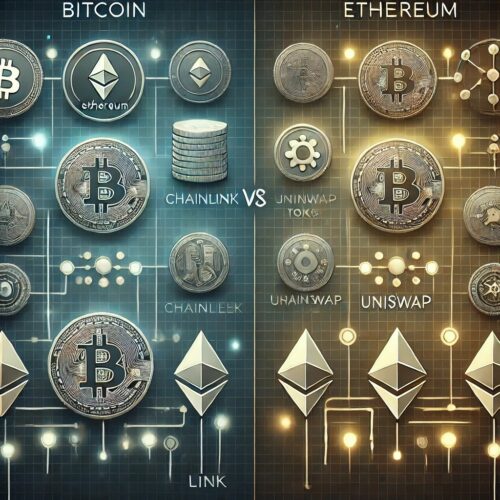The terms “coins” and “tokens” are often used interchangeably, but they represent distinct types of digital assets in the cryptocurrency world. Here’s a detailed breakdown to clarify the differences:
What Are Coins?
Definition:
Coins are cryptocurrencies that operate on their own blockchain network. They serve as a medium of exchange, a store of value, or a means of transferring assets. Coins are typically used for payments or as digital cash.
Examples of Coins:
- Bitcoin (BTC): The first cryptocurrency, designed as a decentralized digital currency.
- Ethereum (ETH): Used for transactions and powering the Ethereum blockchain’s smart contracts.
- Litecoin (LTC): A faster alternative to Bitcoin.
Key Features:
- Independent Blockchain: Coins like Bitcoin and Ethereum run on their own blockchain infrastructure.
- Primary Use Case: Coins are mainly used as a currency or a means to facilitate transactions.
What Are Tokens?
Definition:
Tokens are digital assets created on an existing blockchain. They do not have their own blockchain and rely on a host network like Ethereum, Binance Smart Chain, or Solana.
Examples of Tokens:
- Chainlink (LINK): A token on the Ethereum blockchain used in decentralized oracles.
- Uniswap (UNI): A governance token for the Uniswap protocol.
- Tether (USDT): A stablecoin pegged to the value of fiat currencies, operating on multiple blockchains.
Key Features:
- Dependent on a Host Blockchain: Tokens are built using the blockchain’s standards, such as Ethereum’s ERC-20 or Binance Smart Chain’s BEP-20.
- Diverse Use Cases: Tokens can represent assets, access to a service, governance rights, or be pegged to a fiat currency (e.g., stablecoins).

How to Differentiate Coins and Tokens?
- Does It Have Its Own Blockchain?
- Yes: It’s a coin.
- No: It’s a token.
- Primary Use Case:
- Coins are often used as a medium of exchange or to store value.
- Tokens are more versatile and can represent anything from assets to voting rights.
- Blockchain Dependence:
- Coins are native to their own blockchain (e.g., Bitcoin on Bitcoin blockchain).
- Tokens exist on another blockchain (e.g., LINK on Ethereum).
Why Do We Have Both Coins and Tokens?
- Coins: Focus on being a digital currency or supporting blockchain transactions.
- Tokens: Expand functionality by creating programmable assets and tools on existing blockchain ecosystems.
Are Coins or Tokens Better for Investment?
It depends on your goals:
- Coins: More stable and fundamental to blockchain networks.
- Tokens: Offer more innovative use cases and sometimes higher potential for growth, though they may be riskier.
Risks of Investing in Coins and Tokens
- Coins:
- Volatility: Prices can fluctuate significantly.
- Adoption Risk: Coins like Bitcoin and Ethereum are widely used, but others may fail to gain traction.
- Tokens:
- Smart Contract Risks: Tokens rely on the security of their host blockchain and the smart contract code.
- Regulatory Risk: Tokens, especially those representing assets, may face legal scrutiny.
In summary, coins are the backbone of blockchains, while tokens represent more specialized or application-based uses. Before investing, evaluate the project’s use case, the underlying blockchain, and its potential for adoption.